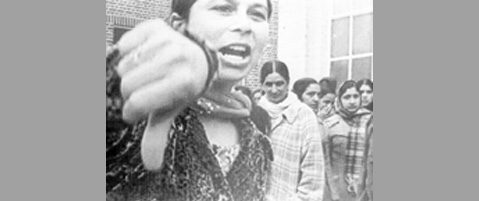Film Programme – Cinenova presents:
Sari Red by Pratibha Parmar, UK, 1988, 11 mins A video poem of remembrance made in memory of a young Asian woman killed by three white youths on the streets of London in 1985.
Who Takes The Rap – Immigration by Lai Ngan Walsh, UK, 1986, 38 mins. This film covers the history of immigration law in Britain from 1903 to the late eighties. The tape describes how different groups of immigrants arrived for work in the UK, only to find increasingly restrictive laws which kept them in low-paid, unskilled work and identified them as ‘undesirable’. Footage of the Garners’ Steak House strike and the Grunwick strike is included to show how these workers fought back against racism. Specific laws are examined and the tape includes interviews with a number of immigrant women. The voices of two women ‘rappers’ provide the commentary throughout, and the story of one woman’s experience in trying to bring her son into Britain runs intermittently through the tape, reinforcing its theme.
Sudeuropa by Maria Iorioa and Raphael Cuomo, Switzerland / Netherlands, 2007, 40 mins. Sudeuropa examines how the national and European migration politics came to light in Lampedusa and reconstructed space, time and everyday life in this little Italian isle. The video gives a portrait of several workers in the tourist industry, arrive in Italy before the Schengen application for agreement, and evokes the presence on the island of immigrants captured by the police and the coast-guards after their departure from the North African coast, excluded in social life and made invisible by their detention in a centre and shows their arrival, their imprisonment and their being sent back. Journalists and camera men line up the bodies, in front of the cameras, put them in the spotlight giving form to the “clandestine” figures of the meridional borders of Europe. Two voices talk about the problem of the invisibility of the migrants on the island, a consequence of the political wish to preserve the interests of tourism, and were they are placed by the national and European media.
About the film selection:From the recent past to this passing moment, these three films delimit a zone where the politics of migration and gender are transmuted into conflictual strategies of staging visibility, with visibility the decisive factor in what gets represented as history.
Power operates in plain sight, hidden from all, while staying out of view is the basis of both extreme control and relative freedom for people criminalized by the only needs that matter, those of the global economy and security states. The aporetic poetics of these works do not set out to portray so much as enter into, and depart from, the critical mediations of the archive, the news media and the cultural institution, and of course the camera itself.
They raise a set of trenchant, if at times oblique, questions about how far visibility can go, when it’s inscribed into the nexus of inclusion/exclusion showing only that which can already everywhere be seen.
Cinenova is a volunteer-run organisation dedicated to preserving and distributing the work of women/feminist film and video makers. An essential approach to thinking through this question of what a feminist film organization can be now is in asserting the broad landscape of political struggles and positions that the films in Cinenova represent. It is in this broad landscape that spans oppositional histories, post-colonial struggles, reproductive labor, representation of race, gender and sexuality; in the relations and alliances between these different struggles, that forms the basis for re-thinking the organization in its identification as a feminist film distributer and the potentiality for this in the present moment.
Book your place
Book online here or alternatively you can contact bookings@rivingtonplace.org / 020 7749 1240
